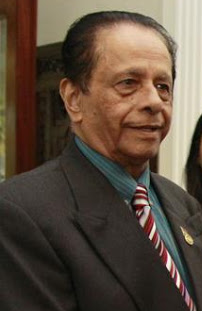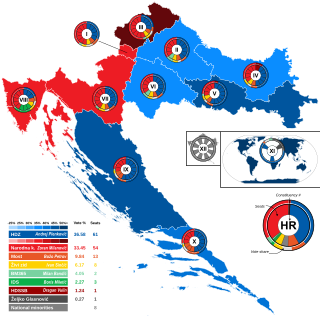 |
|---|
Parliamentary elections were held in Serbia on 24 October 1874 after the National Assembly elected in 1871 completed its three-year term. A total of 97 members were elected, with a further 33 appointed by Prince Milan.
 |
|---|
Parliamentary elections were held in Serbia on 24 October 1874 after the National Assembly elected in 1871 completed its three-year term. A total of 97 members were elected, with a further 33 appointed by Prince Milan.
The elections resulted in a majority of seats being won by the opposition liberals. [1]
The newly elected Assembly convened for the first time on 8 November. Đorđe Topuzović became president of the National Assembly while Jevrem Grujić became vice-president. [1]
The Assembly was officially opened with a speech from Milan on 10 November. However, the debate that followed the speech led to the resignation of Prime Minister Jovan Marinović after it became apparent his conservative government did not have enough support in parliament. [1] This was the first time that a government had been brought down by the National Assembly. [2] Three days later Milan appointed Aćim Čumić as Prime Minister, but on 26 November the Assembly was adjourned until 14 January 1875. [1] In January another government was formed, this time led by Danilo Stefanović, but it was also received poorly by parliament. As a result, the National Assembly was dissolved on 13 March and fresh elections called. [1] A decree by Milan on 20 July 1875 set the election date as 3 August. [1]

The politics of Bulgaria take place in a framework of a parliamentary representative democratic republic, whereby the prime minister is the head of government, and of a multi-party system. Executive power is exercised by the government. Legislative power is vested in both the government and the National Assembly. The Judiciary is independent of the executive and the legislature.

The politics of Gabon takes place in a framework of a republic whereby the president of Gabon is head of state and in effect, also the head of government, since he appoints the prime minister and his cabinet. The government is divided into three branches: the executive headed by the prime minister, the legislative that is formed by the two chambers of parliament, and the judicial branch. The judicial branch is technically independent and equal to the two other branches, although in practice, since its judges are appointed by the president, it is beholden to the same president. Since independence the party system is dominated by the conservative Gabonese Democratic Party.

The Politics of Serbia and Montenegro, known as the Federal Republic of Yugoslavia, later renamed as Serbia and Montenegro, took place in a framework of a federal parliamentary republic with a multi-party system, and after 2003, in the context of a confederation. The president was head of state and, following constitutional reforms in 2003, simultaneously head of government. Executive power was exercised by the Council of Ministers. Federal legislative power was vested in the Serbia-Montenegro Parliament.

Politics in Portugal operates as a unitary multi-party semi-presidential representative democratic republic, whereby the Prime Minister of Portugal is the head of government, and the President of Portugal is the non-executive head of state which, although it is a somewhat ceremonial figure, has some significant political powers they exercise often. Executive power is exercised by the Government, whose leader is the prime minister. Legislative power is primarily vested in the Assembly of the Republic, although the government is also able to legislate on certain matters. The Judiciary of Portugal is independent of the executive and the legislature. The President exerts a sort of "moderating power", not easily classified into any of the traditional three branches of government.
A motion or vote of no confidence is a motion and corresponding vote thereon in a deliberative assembly as to whether an officer is deemed fit to continue to occupy their office. The no-confidence vote is a defining constitutional element of a parliamentary system, in which the executive's mandate rests upon the continued support of the majority in the legislature. Systems differ in whether such a motion may be directed against the prime minister, against individual cabinet ministers, against the cabinet as a whole, or some combination of the above.

The prime minister of France, officially the prime minister of the French Republic, is the head of government of the French Republic and the leader of the Council of Ministers.

Sir Anerood Jugnauth, GCSK, PV, was a Mauritian statesman, politician and barrister who served both as President and Prime Minister of Mauritius. He was Member of Parliament for Piton & Riviere Du Rempart. A central figure of Mauritian politics in the 1980s and 1990s, he was Leader of the Opposition from 1976 to 1982. He served four consecutive terms as prime minister from 1982 to 1995 and again from 2000 to 2003. He was then elected as President from 2003 to 2012. Following his party's victory in the 2014 general elections, he served his sixth and final term as prime minister, becoming the nation's longest serving prime minister with more than 18 years of tenure, overtaking Seewoosagur Ramgoolam, who held the office for 14 years.
In politics, a lame duck or outgoing politician is an elected official whose successor has already been elected or will be soon. An outgoing politician is often seen as having less influence with other politicians due to their limited time left in office. Conversely, a lame duck is free to make decisions that exercise the standard powers with little fear of consequence, such as issuing executive orders, pardons, or other controversial edicts. Lame duck politicians result from term limits, planned retirement, or electoral losses, and are especially noticeable where political systems build in a delay between the announcement of results and the taking of office by election winners. Even at the local level, politicians who do not seek re-election can lose credibility and influence. Uncompleted projects may fall to the wayside as their influence diminishes.
A snap election is an election that is called earlier than the one that has been scheduled. Generally, a snap election in a parliamentary system is called to capitalize on an unusual electoral opportunity or to decide a pressing issue, under circumstances when an election is not required by law or convention. A snap election differs from a recall election in that it is initiated by politicians rather than voters, and from a by-election in that a completely new parliament is chosen as opposed to merely filling vacancies in an already established assembly. Early elections can also be called in certain jurisdictions after a ruling coalition is dissolved if a replacement coalition cannot be formed within a constitutionally set time limit.

The Jatiya Sangsad, often simply referred to as Sangsad and also known as the House of the Nation, is the supreme legislative body of Bangladesh. The current parliament of Bangladesh contains 350 seats, including 50 seats reserved exclusively for women. Elected occupants are called members of Parliament, or MPs. The 12th national parliamentary election was held on 7 January 2024. Elections to the body are held every five years, unless a parliament is dissolved earlier by the President of Bangladesh.

Ivica Dačić is a Serbian politician serving as deputy prime minister of Serbia since 2022 and minister of internal affairs since 2024. He has been the leader of the Socialist Party of Serbia (SPS) since 2006.

The Parliament of Pakistan is the supreme legislative body of the Islamic Republic of Pakistan. It is a bicameral federal legislature, composed of the President of Pakistan and two houses: the Senate and the National Assembly. The president, as head of the legislature, has the power to summon or prorogue either house of the Parliament. The president can dissolve the National Assembly, only on the Prime Minister's advice.

Borut Pahor is a Slovenian politician who served as President of Slovenia from 2012 to 2022. He previously served as Prime Minister of Slovenia from 2008 to 2012.
The politics of Kosovo takes place in a framework of a multi-party parliamentary representative democratic republic, whereby the President (Presidenti) is the head of state and the Prime Minister (Kryeministri) the head of government. Parliamentary elections are held every four years, the most recent in 2021.

The Alliance of Independent Social Democrats is a Serb political party in Bosnia and Herzegovina. Founded in 1996, it is the governing party in Republika Srpska, with its leader, Milorad Dodik, serving as the current president of Republika Srpska. The party's vice-president, Željka Cvijanović, is the current member of the Presidency of Bosnia and Herzegovina, while SNSD member Radovan Višković is the current prime minister of Republika Srpska.

The Politics of Serbia are defined by a unitary parliamentary framework that is defined by the Constitution of Serbia in which the president, currently Aleksandar Vučić, is the head of state while the prime minister, currently Miloš Vučević, is the head of government. Executive power is exercised by the Serbian government and the President of Serbia. Legislative power is vested in the unicameral National Assembly which is composed of 250 proportionally elected deputies. The judiciary is independent and is headed by the Supreme Court of Cassation, which is also the highest court in Serbia.
The People's Radical Party was a populist political party in Serbia and later Yugoslavia. Led by Nikola Pašić for most of its existence, its ideological profile has significantly changed throughout its history, shifting from socialism and radicalism towards conservatism in the early 20th century.

The National Assembly of Thailand is the bicameral legislative branch of the government of Thailand. It convenes in the Sappaya-Sapasathan, Dusit District, Bangkok.

Parliamentary elections were held in Croatia on 11 September 2016, with all 151 seats in the Croatian Parliament up for election. The elections were preceded by a successful motion of no confidence against Prime Minister Tihomir Orešković and his cabinet on 16 June 2016, with 125 MPs voting in favour of the proposal. A subsequent attempt by the Patriotic Coalition to form a new parliamentary majority, with Minister of Finance Zdravko Marić as Prime Minister, failed and the Parliament voted to dissolve itself on 20 June 2016. The dissolution took effect on 15 July 2016, which made it possible for President Kolinda Grabar-Kitarović to officially call for elections on 11 September 2016. These were the ninth parliamentary elections since the 1990 multi-party elections.
Snap parliamentary elections were held in Serbia on 3 August 1875 following the early dissolution of the National Assembly elected the previous year.